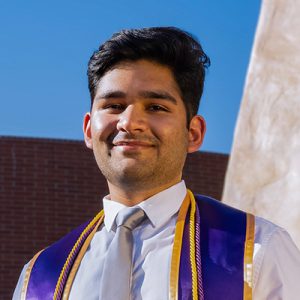Physics
Physics answers the question of how and why things work.
As a student of physics, you will learn to effectively inquire a wide range of earth’s phenomena — from the forces that govern subatomic particles to the large-scale phenomena that shape our universe.
Develop an understanding of concepts and laws
A strong foundation in classical and modern physics and in applied mathematics is crucial to the scientific inquiries of physics. You will develop an understanding of the fundamental concepts and laws of physics and acquire familiarity with data acquisition and analysis instrumentation. Through a combination of interactive lectures, instructive demonstrations, and laboratory experiments, you will hone your knowledge and skills from multiple angles.
Model the world through mathematics and experimentation
You will translate physical problems into mathematical models by analyzing the physical situation for dominant effects and describing those effects in terms of mathematical variables. You will then solve and interpret these problems using the tools of mathematics.
You will employ the scientific method in the execution of experiments and the analysis of experimental results. Your experience will give you the opportunity and ability to work independently as well as engage in successful collaborations.
Get practical experience through internships and research
Physics majors often participate in summer undergraduate research programs as well as internships with local industries. The practical experience these opportunities provide is invaluable, and we will heavily encourage you to participate in them.
As a senior, you will apply both theoretical and experimental approaches in your capstone course, which culminates in an original research paper. This research is then often presented at a national meeting. Past topics of student research have included fluid dynamics, biomedical engineering, laser medicine, nuclear radiation, and digital communication.
Choose your preferred degree path
We offer two degree programs to choose from. Our bachelor of science degree serves as an excellent foundation if you are interested in graduate studies in physics or engineering, whereas our bachelor of arts degree allows you to explore the relationship of physics with another area of interest for future preparation in medicine, law, business and other fields of practice.
At a Glance

Degree Type
Bachelor of Arts
Bachelor of Science
Department
School/College
College of Arts and Sciences
Next Steps
Interested in this major? Here's what you can do next:
Having these hands-on experiences at Cal Lutheran will give you an idea of what cutting-edge research really looks like. I’ve been able to learn and I’ve had fun doing it because of my peers and professors.
Khusanjon Bobohkojaev
With challenging and relevant courses, outstanding faculty, small class sizes, and an emphasis on hands-on learning, the physics program will position you to succeed in your chosen career.
Degree requirements
Find out what it takes to earn a degree in physics and explore the courses.
Highlighted Courses
Get familiar with some of the courses you might take in this major.
PHYS 211: Physics for Scientists and Engineers
This calculus-based introductory course, primarily intended for science majors, covers linear and circular motion, Newton's Laws, oscillatory motion, waves, sound, fluids, and elasticity.
Read descriptionPHYS 303: Modern Physics
We will move beyond limitations of classical physics and introduce the foundations for the Theory of Relativity and quantum mechanics. This is the physics of the very fast, and the very small. The first part of the course is dedicated to the study of special relativity, including time dilation, space contraction, simultaneity, Lorentz transformations, relativistic energy and momentum, internal energy, the relativistic doppler effect, among other foundational topics
Read descriptionPHYS 309: Applied Electronics
Includes the study of DC and AC circuit analysis, network theorems, digital logic and logic network design, analog circuit design and digital computer interface.
Read descriptionPHYS 340: Advanced Experimental Physics
This course focuses on performing experimentally-based investigations in physics. Students develop skills programming data acquisition interfaces, using advanced equipment and performing data analysis. Important research skills covered include literature searches, experiment design and theory, laboratory techniques, and communication of research through oral presentations and written material. Topics investigated are drawn from multiple areas such as quantum physics, electricity and magnetism, optics and astronomy.
Read descriptionPHYS 420: Electrodynamics
Solution techniques of Maxwell's equations are developed for static and time dependent electric and magnetic fields. Specific topics include: The electrical potential and Laplace's equation, boundary value problems, multipole expansions, electric and magnetic fields in matter, electrodynamics, and the propagation of electromagnetic fields through media. Also includes introduction to special relativity and relativistic electrodynamics.
Read descriptionPHYS 430: Quantum Physics
An introduction to quantum theory, beginning with the Schrödinger equation and the statistical interpretation of the wave function. One-dimensional applications, include the harmonic oscillator, square-well potentials and tunneling. Three dimensional applications include, the theory of angular momentum, spin, the hydrogen atom, identical particles, time-independent perturbation theory and the Pauli exclusion principle. Other approximate solution techniques with applications to atoms, molecules, and solids are presented.
Read descriptionRecommended Minors
Want to add even more value to your degree? Consider one of these minors to gain a unique combination of skills and perspectives.
We offer hands-on opportunities that give you the freedom to explore your passion through real-world work and prepare for a fulfilling career.
-
Learning in Action
We emphasize “doing” science and an active approach to learning. Throughout your classes, you’ll gain a lot of research experience by working side-by-side with your professors in state-of-the-art facilities. You’ll design experiments, collect scientific data, perform statistical analysis and share your conclusions through research papers and presentations.
-
Conference Presentations
Many of our students have the opportunity to perform independent research with faculty advisors on campus and present their findings at research consortiums, such as our annual Festival of Scholars or off-campus conferences.
-
Research Opportunities
Students participate in physics research with their professors at Cal Lutheran, as well as at other institutions across the United States through Research Experiences for Undergraduate (REU) programs. Areas of study include materials physics, particle physics, astrophysics and more.
- See the list of recent research projects done by physics students
- Take advantage of full-time summer research fellowships
- Browse the available REU programs
-
Student Clubs
The Physics Club, an official chapter of the Society of Physics Students, creates a community of students who are interested in physics. Each year, the club completes a service project to support the campus and surrounding community related to their academic interests.
-
Honors Society
To build additional experience, you can join the National Physics Honors Society, Sigma Pi Sigma.
-
Fellowships
Physics students have received fellowships funded by the National Science Foundation (NSF), opportunities which are available to current and incoming students within our program.
-
STEM Living-Learning Community
Located in Conejo Hall, this program allows residential students in STEM majors to more frequently interact with peers and faculty members in their discipline, enabling them to easily form study groups. Additionally, STEM-focused programming provided by Residence Life staff and faculty members allows for integrated learning between the classroom and residence hall. Learn more

Physics is the primordial science that tries to understand and model the “why?”, “how?” and “when?” of our universe. As a curious person, this everlasting quest for answers drew me to physics. At Cal Lutheran, the physics department gave me the instruction and opportunities to become a great experimentalist through numerous hands-on experiences.
Javier Berjon de la Parra '20
Technology firms, research laboratories, educational institutions and the military regularly hire our physics graduates. Before pursuing their careers, many of our students also attend graduate programs for physics, engineering, computer science, mathematics, optical science, business, medicine or law. Physics majors score well on the MCAT and LSAT, the entrance exams for medical school and law school.
Potential Careers
Physics Teachers, Postsecondary
Teach courses pertaining to the laws of matter and energy. Includes both teachers primarily engaged in teaching and those who do a combination of teaching and research.
Read descriptionAstronomers
Observe, research, and interpret astronomical phenomena to increase basic knowledge or apply such information to practical problems.
Read descriptionPhysicists
Conduct research into physical phenomena, develop theories on the basis of observation and experiments, and devise methods to apply physical laws and theories.
Read descriptionMaterials Scientists
Research and study the structures and chemical properties of various natural and synthetic or composite materials, including metals, alloys, rubber, ceramics, semiconductors, polymers, and glass. Determine ways to strengthen or combine materials or develop new materials with new or specific properties for use in a variety of products and applications. Includes glass scientists, ceramic scientists, metallurgical scientists, and polymer scientists.
Read descriptionElectrical Engineers
Research, design, develop, test, or supervise the manufacturing and installation of electrical equipment, components, or systems for commercial, industrial, military, or scientific use.
Read descriptionMechanical Engineers
Perform engineering duties in planning and designing tools, engines, machines, and other mechanically functioning equipment. Oversee installation, operation, maintenance, and repair of equipment such as centralized heat, gas, water, and steam systems.
Read descriptionAerospace Engineers
Perform engineering duties in designing, constructing, and testing aircraft, missiles, and spacecraft. May conduct basic and applied research to evaluate adaptability of materials and equipment to aircraft design and manufacture. May recommend improvements in testing equipment and techniques.
Read descriptionCivil Engineers
Perform engineering duties in planning, designing, and overseeing construction and maintenance of building structures and facilities, such as roads, railroads, airports, bridges, harbors, channels, dams, irrigation projects, pipelines, power plants, and water and sewage systems.
Read descriptionEmployers
Some of the organizations our graduates work for include:
- Aerojet Rocketdyne
- AMSL
- Astra
- Burns & McDonnell
- Degenkolb Engineers
- Double A Labs
- Karagozian & Case
- Naval Sea Systems Command
- Openlight Photonics
- Optotest Corporation
- SandBox Semiconductor
- Starship Technologies
- Teradyne
- Tesla
- Thermo Fisher Scientific
- Verdantas
Graduate Schools
Our alumni have pursued advanced degrees at:
- Arizona State University, PhD Electrical Engineering
- California State University, Northridge, MS Physics
- Oregon State University, MS Ocean Engineering
- Radbound University (Netherlands), MS Physics
- San Diego State University, MS Mechanical Engineering
- University of California, Irvine, PhD Physics
- University of California, Los Angeles, PhD Aerospace Engineering
- University of California, Santa Barbara, MS Electrical Engineering
- University of Delaware, MS Civil/Environmental Engineering
- University of Oregon, MS Applied Physics
- University of Rochester, PhD Physics/Optics
- University of Texas at Austin, MS Aerospace Engineering
- West Virginia University, MS Aerospace Engineering

In both physics and computer science, I particularly enjoyed delving into research projects that allowed me to apply theoretical knowledge to real-world problems. Overall, the combination of hands-on research opportunities, engaging classes, and supportive faculty made my experience at Cal Lutheran truly rewarding and memorable.
Rishabh Sarin '22
Programmer I, Enterprise Applications, Information Technology Services, California Lutheran University
This page includes information from O*NET OnLine by the U.S. Department of Labor, Employment and Training Administration (USDOL/ETA). Used under the CC BY 4.0 license. Some occupations listed above may require a related graduate degree.
How We Prepare You for Success
We have 20,000+ employer contacts for jobs and internships, with over 200 listings posted each week.
Our excellent career counselors in the Career Services center will get in touch with you during your very first term on campus. They offer over 50 workshops each year on resume writing, interviewing, salary negotiations, applying to graduate schools, and other critical skills to help you begin your career successfully.
After you graduate from Cal Lutheran, you receive free access to Career Services for life, as a valued member of our alumni family.
of Cal Lutheran graduates find a job or enroll in graduate school within nine months
We work with students and families to make sure everyone who is admitted to Cal Lutheran can afford it.
Tuition & Fees
You and your family might have questions about how you’ll cover the costs of college. We can tell you this — it costs less than you think.
Scholarships & Grants
We offer a range of awards based on academic merit and financial need. This is money that does not need to be repaid.
Net Price Calculator
Take a few minutes to use our calculator and get yourself a personalized estimate of your costs and financial aid.
Let us know and we'll send you information about our academics, campus life, the admission process, and more!
Ready to apply?
We’re now accepting applications for Fall 2026!
Level Up Your College Search
Check out our college success guides to help you navigate the search process.

How to Choose a College Major
Your major will be a significant part of your academic experience. How do you pick the right one?

5 Tips for Applying to College
Learn how to look good when applying to colleges, with personal tips to stand out from Cal Lutheran admission counselors.

How to Afford College
Read this guide to minimize costs as you save for college during high school — learn all about scholarships, financial aid, FAFSA, and more!

5 Key Advantages of a Liberal Arts Education
Are the liberal arts still worth studying in today's world? If you want a future-proof college education — absolutely.

How to Get Recruited for College Athletics
Check out our tips to connect with coaches, navigate campus visits, and move forward with confidence.

Private vs. Public Universities
The differences between each — and how to choose the school with your dream college experience.
